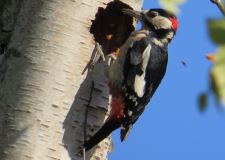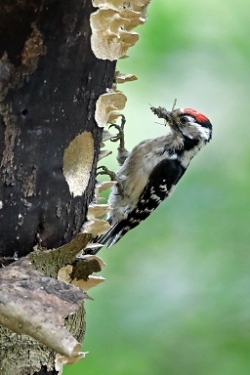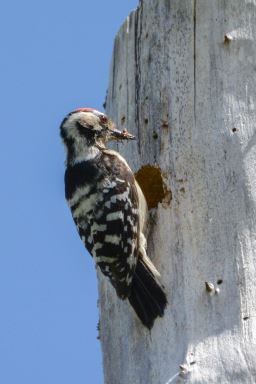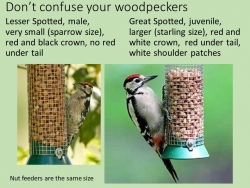
Lesser Spotted Woodpeckers – the 2025 breeding season
- Details
2025 has been a record breeding season for Lesser Spotted Woodpeckers. Thanks to the efforts of all the LesserSpot Network volunteers, we have the details from 24 active nests – the highest total we have monitored since we started woodpecker network in 2015. In most years we hear of a few nests reported later in the year through the Bird Recorder network so the total could eventually be even higher. This is obviously a small fraction of the national total (last estimated as 2000 territories) but is still a good sample. Our previous highest total was 23 nests reported in 2019.
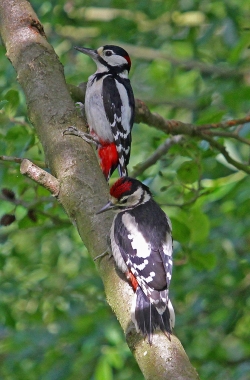
Is that a Lesser Spotted or Great Spotted Woodpecker in your garden?
- Details
Great Spots are found widely throughout Britain, they are common in woodland and readily visit garden feeders. Lesser Spots are scarce and rarely seen. So you are much more likely to see a Great Spot than a Lesser Spot.
You can easily tell the difference………..

Last chance to find a Lesser Spotted Woodpecker nest
- Details
Now is your last chance and a good time to find a Lesser Spotted Woodpecker nest, For the next weekor two LSW young will be calling from the nest hole and you may hear them. So have a good search in your local woods.
Lesser Spot Net volunteers are already watching/monitoring twelve nests accross the Midlands and South of England.
If you find a nest please let us know so that we can help you monitor it and gather useful information to help the Lesser Spot Net project.
Lesser Spotted Woodpeckers in the Wyre Forest - 1st chicks of 2025
- Details
 LesserSpotNet volunteer organisers, Ken and Linda Smith, were delighted to visit the Wyre Forest National Nature Reserve in Worcestershire on 2 May. We were guests of Natural England who employed an expert contractor, Craig, to survey Lesser Spotted Woodpeckers this spring. The forest, mainly Oak woodland, is a stronghold for Lesser Spots and much other wildlife and is estimated to hold at least 15 pairs. Craig had found four Lesser Spot nest sites so far this year.
LesserSpotNet volunteer organisers, Ken and Linda Smith, were delighted to visit the Wyre Forest National Nature Reserve in Worcestershire on 2 May. We were guests of Natural England who employed an expert contractor, Craig, to survey Lesser Spotted Woodpeckers this spring. The forest, mainly Oak woodland, is a stronghold for Lesser Spots and much other wildlife and is estimated to hold at least 15 pairs. Craig had found four Lesser Spot nest sites so far this year.
The first nest had a female LSW incubating seven eggs, this is an above average clutch size, which is good. Note: in the photo some of the eggs are hidden under the bird.

Lesser Spotted Woodpecker Workshop March 2025
- Details
Woodpecker Network was pleased to organise a workshop to discuss the monitoring and conservation of the Lesser Spotted Woodpecker on 19th March 2025. Understanding the drivers and arresting the decline of the Lesser Spotted Woodpecker is a nationally high conservation priority.
